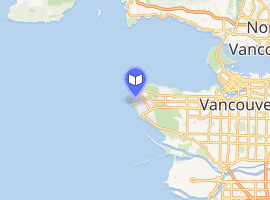Xwi7xwa Library
The X̱wi7x̱wa Library IPA: [χʷiʔχʷa] is an indigenous library at the Vancouver campus of the University of British Columbia. The library, which draws its name from the Squamish word for echo, is notable for its approaches to organizing First Nations knowledge and major collections and holdings.
| Country | Canada |
|---|---|
| Type | Academic library, Archives |
| Location | University of British Columbia, Greater Vancouver |
| Coordinates | 49.26546°N 123.25663°W |
| Branch of | University of British Columbia Library |
| Map | |

| |
History
X̱wi7x̱wa Library began as a small collection of Aboriginal materials in a mobile home. The collection was maintained in conjunction with UBC's NITEP Indigenous Teacher Education Program.[1]
In 1993, the library became the First Nations House of Learning Library, part of a longhouse for indigenous students and scholars. The University's senate later established a X̱wi7x̱wa librarian position in 1995,[2] which was first held by Gene Joseph.[3]
The library began digitizing materials related to the First Nations House of Learning Longhouse in 2008, with the goal of sharing university resources with Aboriginal people worldwide.[4]
As of 2015, the library held over 15,000 items, consisting primarily of Aboriginal materials.[2]
Classification and cataloging
The X̱wi7x̱wa Library uses First Nations House of Learning (FNHL) Subject Headings, a local taxonomy that remedies many of the shortcomings of the Library of Congress Subject Headings with regard to First Nations materials. This classification system arranges First Nations geographically and refers to them using their own names, rather than alphabetically by their European names.[1] In 2004, the 11,000 FNHL headings were lost due to a system migration, and were not recovered until 2009.[5]
The library employs a British Columbia-specific variant of the Brian Deer Classification System, an organization system which prioritizes relationships in its structure, reflecting an Indigenous worldview.[2]
The library also records a subjective measure of suitability of materials that may be used to teach indigenous children. This practice rejects dominant conceptions of cataloging as "objective" and recognizes the ongoing misrepresentation of Indigenous people.[2]
References
- Lin, Brian (8 July 2004). "Library a Gem in Aboriginal Scholarship". UBC Reports: 7. doi:10.14288/1.0118270.
- Doyle, Ann; Lawson, Kimberley; Dupont, Sarah (December 2015). "Indigenization of Knowledge Organization at the Xwi7xwa Library". International Journal of Library and Information Studies: 107–134. doi:10.14288/1.0103204. hdl:2429/54261.
- "VIU Honours First Nations Advocate with Honorary Degree | News | VIU". news.viu.ca. Retrieved 2018-06-03.
- Xwi7xwa Library (26 April 2013). "Xwi7xwa Library June 2008 Update". doi:10.14288/1.0103212. hdl:2429/29942. Cite journal requires
|journal=(help) - Xwi7xwa Library (26 April 2013). "Xwi7xwa Library June 2009 Update". doi:10.14288/1.0103207. hdl:2429/29941. Cite journal requires
|journal=(help)